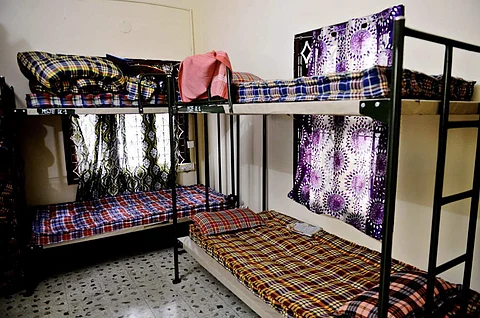

With the hostel presidents at the Jawaharlal Nehru University (JNU) protesting for basic hostel facilities, we bring you a glimpse of what staying in a hostel is like.
The quality of hostel facilities in Indian colleges varies widely. A few universities have state-of-the-art hostels with all the latest amenities, while others have more basic facilities. However, even the most basic hostels typically provide students with a bed, a desk, a chair, and a wardrobe. Many hostels also have common rooms with televisions, indoor games, and reading rooms.
Some of the common hostel facilities in Indian colleges include:
Accommodation: Hostels typically offer students a variety of room types, including single rooms, double rooms, and triple rooms. Some hostels also offer suites with private bathrooms and kitchens.
Food: Hostels typically have a mess hall where students can eat their meals. The food served in the mess hall is usually vegetarian and is subsidised by the university. Some hostels also have kitchens where students can cook their own food.
Security: Hostels are typically well-guarded and have CCTV cameras installed. Many hostels also have curfew rules for students.
Other facilities: Some hostels also offer students access to other facilities, such as gyms, libraries, and sports grounds.
The cost of living in a hostel varies depending on the university and the type of room. However, it is generally much cheaper to live in a hostel than to rent an apartment outside of campus.
Benefits of living in a hostel
There are many benefits to living in a hostel. Some of the key benefits include:
Affordability: Hostels are generally much cheaper than renting an apartment outside of campus. This can be a major financial benefit for students, especially those who come from low-income families.
Convenience: Hostels are typically located on or near campus, which makes it easy for students to get to and from class. This can save students a lot of time and energy.
Sense of community: Hostels provide students with a unique opportunity to socialise and make friends from all over the country. This can help students feel more connected to their university and to the world around them.
Support: Hostels often have staff members who can provide students with support and guidance. This can be especially helpful for students who are new to university or who are struggling academically or personally.
Challenges of living in a hostel
There are also some challenges associated with living in a hostel. Some of the key challenges include:
Lack of privacy: Students who live in hostels typically have less privacy than they would if they were living in their own apartments. This can be difficult to adjust to, especially for students who are used to having a lot of privacy.
Noise: Hostels can be noisy places, especially at night. This can be disruptive for students who are trying to study or sleep.
Rules and regulations: Hostels typically have a number of rules and regulations that students must follow. This can be frustrating for some students, especially those who are used to having more freedom.
Overall, the benefits of living in a hostel outweigh the challenges. Hostels can provide students with a safe, affordable, and supportive environment in which to live and learn.
